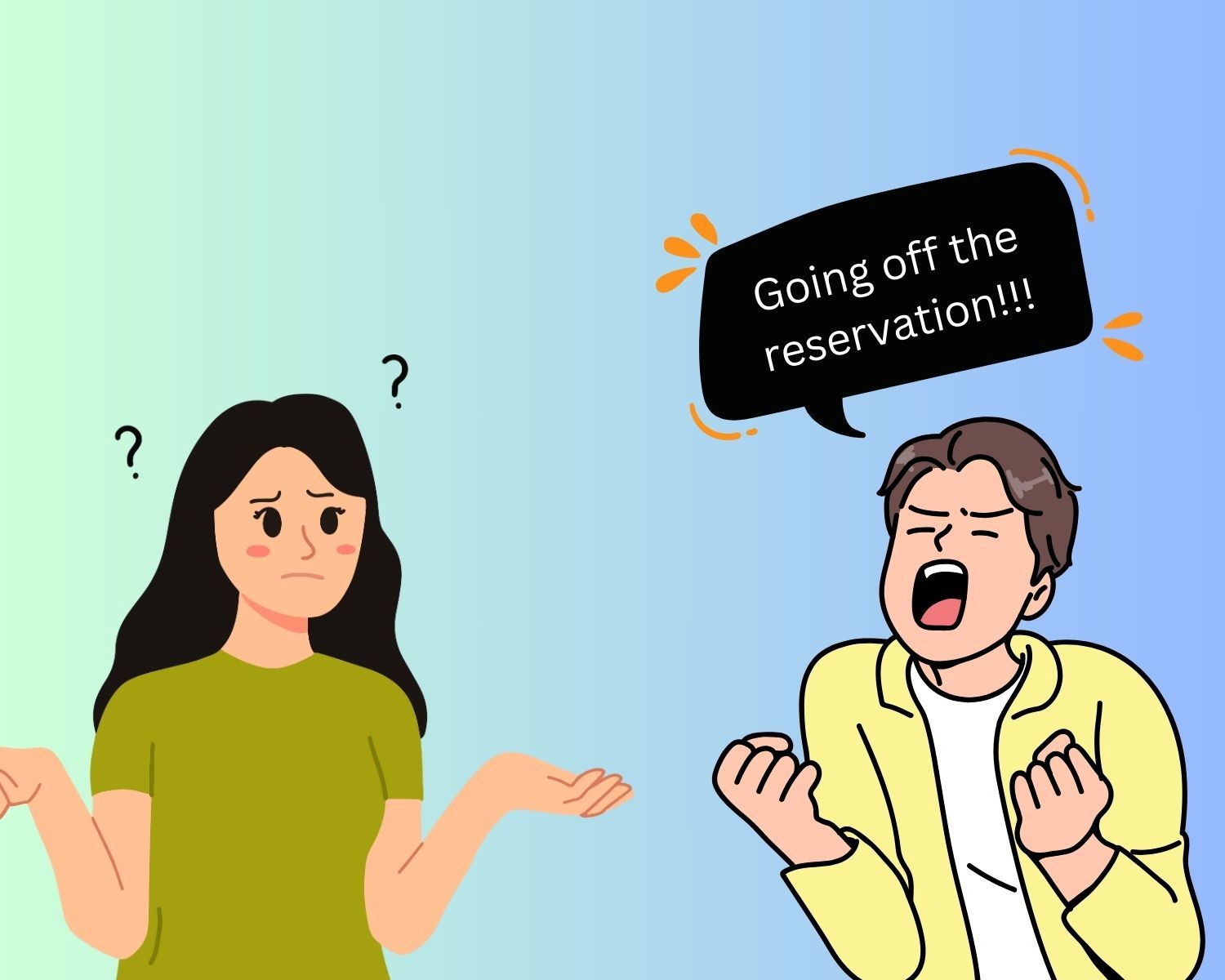Home>Opinion and Editorial>Is ‘Going Off The Reservation’ Offensive?


Opinion and Editorial
Is ‘Going Off The Reservation’ Offensive?
Published: February 8, 2024
Discover the debate around the phrase "going off the reservation" and whether it's considered offensive. Read opinions and editorials on this topic.
(Many of the links in this article redirect to a specific reviewed product. Your purchase of these products through affiliate links helps to generate commission for Regretless.com, at no extra cost. Learn more)
Table of Contents
Introduction
In today's diverse and interconnected world, the language we use holds significant power. Phrases and expressions, often rooted in historical contexts, can carry deep connotations and implications. One such phrase that has sparked debate and controversy is "going off the reservation." This seemingly innocuous expression has come under scrutiny for its potentially offensive and harmful undertones, prompting a closer examination of its origins, evolution, and contemporary relevance.
The phrase "going off the reservation" has long been a part of the English language, commonly used to describe someone who is behaving in a way that deviates from the expected or accepted norms. However, the origins of this expression can be traced back to a darker chapter in history, rooted in the displacement and mistreatment of Native American communities.
As we delve into the history of this phrase, it becomes apparent that its usage carries weighty implications, often evoking a sense of disregard for cultural boundaries and a dismissal of established norms. In recent years, heightened awareness of the importance of respectful and inclusive language has brought the phrase under increased scrutiny, leading to discussions about its appropriateness and potential to perpetuate harmful stereotypes.
In this article, we will explore the origins and evolution of the phrase "going off the reservation," shedding light on its historical context and the impact of its usage in contemporary discourse. By delving into the complexities surrounding this expression, we aim to foster a deeper understanding of the sensitivities associated with language and the significance of thoughtful, respectful communication in our increasingly diverse society.
Understanding the Origins of the Phrase
The phrase "going off the reservation" carries a historical weight that traces back to the forced relocation and confinement of Native American tribes by the U.S. government in the 19th and early 20th centuries. During this period, Native American communities were coerced into living on designated reservations, often far removed from their ancestral lands and traditional ways of life. The reservations, established through a series of treaties and policies, were intended to confine and control the movements of indigenous peoples, effectively curtailing their autonomy and freedom.
The phrase "going off the reservation" originally referred to the act of leaving the confines of these designated areas without authorization. It symbolized a breach of the imposed boundaries and a defiance of the government's attempts to regulate the movements and activities of Native American individuals and communities. This historical context imbues the phrase with deeply troubling connotations, rooted in the systemic oppression and marginalization of indigenous peoples.
The use of this expression in contemporary language often overlooks its origins, perpetuating a disconnect from the painful history it represents. By invoking the phrase without acknowledging its roots, individuals may inadvertently perpetuate the erasure of Native American experiences and perpetuate harmful stereotypes. The phrase's casual usage in everyday conversation belies the profound suffering and injustice endured by Native American communities throughout history.
As we strive for greater cultural awareness and sensitivity, it is crucial to recognize the implications of language and the historical baggage carried by seemingly innocuous expressions. Understanding the origins of the phrase "going off the reservation" necessitates a reckoning with the injustices inflicted upon Native American peoples and a commitment to mindful, respectful communication that honors their experiences and challenges the perpetuation of harmful narratives.
By acknowledging the historical context of this phrase, we can cultivate a more empathetic and inclusive approach to language, fostering a deeper understanding of the complexities of cultural heritage and the enduring impact of historical trauma. This awareness prompts us to consider the weight of our words and the importance of engaging in thoughtful, respectful dialogue that acknowledges and respects the diverse experiences and histories that shape our world.
The Evolution of the Phrase
The phrase "going off the reservation" has undergone a significant evolution in its usage and connotations over time. While its origins are deeply rooted in the historical oppression of Native American communities, the expression has evolved to encompass broader implications, often extending beyond its original context. This evolution reflects the dynamic nature of language and the ways in which phrases can acquire new meanings and associations as they permeate different spheres of discourse.
Initially tied to the confinement and control of Native American tribes, the phrase "going off the reservation" was laden with the weight of government-imposed boundaries and the defiance of those boundaries. However, as language is inherently fluid and adaptable, the expression gradually transcended its original context, becoming a part of colloquial language and extending to diverse situations and behaviors.
In contemporary usage, the phrase has come to signify a departure from expected norms, a deviation from prescribed paths, or a disregard for established boundaries. This broader application has allowed the phrase to permeate various domains, from casual conversations to professional settings, where it is used to convey a sense of deviation, recklessness, or nonconformity.
The evolution of the phrase also reflects the shifting cultural landscape and the changing dynamics of power and autonomy. While its historical roots remain deeply entrenched in the experiences of Native American communities, the phrase has acquired a broader relevance, resonating with individuals and groups navigating issues of autonomy, defiance, and societal expectations.
Despite its expanded usage, the phrase retains its historical baggage, carrying with it the echoes of displacement, coercion, and the erasure of indigenous autonomy. This dual nature of the phrase underscores the complexities of language, as it simultaneously evolves and retains historical significance, reflecting the interplay between linguistic adaptation and the enduring impact of historical narratives.
As we consider the evolution of the phrase "going off the reservation," it becomes evident that language is a living entity, constantly shaped by cultural shifts and societal dynamics. This evolution underscores the importance of critically examining the implications of our words, recognizing the historical weight they carry, and engaging in meaningful dialogue that respects the diverse experiences and histories that contribute to the richness of language and communication.
Contemporary Controversy
The phrase "going off the reservation" has become a focal point of contemporary controversy, sparking discussions about its appropriateness and potential to perpetuate harmful stereotypes. In recent years, heightened awareness of the importance of respectful and inclusive language has brought the phrase under increased scrutiny, leading to debates about its impact on Indigenous communities and the broader implications of its usage.
At the heart of the contemporary controversy surrounding this expression lies the recognition of its deeply problematic historical origins. The phrase's ties to the forced relocation and confinement of Native American tribes, along with the associated trauma and oppression, have prompted calls for a reevaluation of its place in modern discourse. Advocates for linguistic sensitivity and cultural awareness argue that the casual use of the phrase perpetuates a disregard for the experiences and struggles of Indigenous peoples, contributing to the perpetuation of harmful narratives and stereotypes.
Furthermore, the contemporary controversy surrounding the phrase "going off the reservation" intersects with broader discussions about the power dynamics inherent in language. It raises questions about who holds the authority to define and shape linguistic norms and the responsibility of individuals and communities to engage in respectful, inclusive communication. The recognition of the phrase's potential to inflict harm and perpetuate historical erasure underscores the need for conscientious language practices that honor diverse cultural experiences and histories.
In the digital age, where global conversations unfold across various platforms and media, the impact of language reaches far and wide. The controversy surrounding the phrase "going off the reservation" has reverberated through social media, academic discourse, and public advocacy, amplifying the calls for heightened awareness and accountability in language use. This widespread scrutiny reflects a growing collective commitment to fostering an inclusive and respectful linguistic landscape, one that acknowledges and respects the diverse cultural narratives that shape our interconnected world.
As the contemporary controversy surrounding the phrase "going off the reservation" continues to unfold, it prompts individuals and communities to engage in critical reflections on the power of language and the impact of historical narratives on present-day discourse. This ongoing dialogue underscores the imperative of recognizing the weight of our words and the importance of embracing language practices that uphold the dignity and experiences of all individuals, particularly those whose voices have been historically marginalized and silenced.
The Impact of the Phrase
The phrase "going off the reservation" carries profound implications that extend beyond its surface-level meaning, permeating both individual perceptions and societal attitudes. Its historical roots in the displacement and confinement of Native American communities imbue the phrase with a weighty impact, shaping the lens through which it is understood and interpreted in contemporary discourse.
At its core, the impact of the phrase is deeply intertwined with its potential to perpetuate harmful stereotypes and erode the experiences of Indigenous peoples. By invoking the phrase without acknowledging its historical context, individuals risk perpetuating a narrative that dismisses the struggles and resilience of Native American communities. This perpetuation of historical erasure and the reinforcement of damaging narratives can contribute to the marginalization of Indigenous voices and experiences, further entrenching the societal imbalances that persist in present-day discourse.
Moreover, the impact of the phrase reverberates through the broader cultural landscape, influencing perceptions of autonomy, defiance, and societal boundaries. Its usage in colloquial and professional settings can inadvertently reinforce a dismissive attitude toward established norms and the experiences of marginalized communities. This impact extends to the perpetuation of power dynamics inherent in language, underscoring the need for conscientious language practices that honor diverse cultural experiences and histories.
In the digital age, where language holds immense power in shaping global conversations, the impact of the phrase "going off the reservation" extends its reach across diverse platforms and media. Its usage in public discourse, media narratives, and everyday conversations contributes to the perpetuation of harmful narratives, influencing individual perceptions and societal attitudes. This impact underscores the urgency of fostering an inclusive and respectful linguistic landscape, one that acknowledges and uplifts the diverse cultural narratives that contribute to the richness of our interconnected world.
As we navigate the complexities of language and historical narratives, it becomes evident that the impact of the phrase "going off the reservation" extends far beyond its immediate usage. It permeates individual consciousness, societal attitudes, and broader cultural dynamics, underscoring the imperative of engaging in thoughtful, respectful dialogue that honors the diverse experiences and histories that shape our shared humanity.
Read more: How To Choose The Best Pokemon Go Team
Conclusion
In conclusion, the phrase "going off the reservation" embodies a complex interplay of historical significance, linguistic evolution, contemporary controversy, and profound impact. Its origins rooted in the forced relocation and confinement of Native American communities underscore the weighty historical baggage it carries, highlighting the need for heightened awareness and sensitivity in its usage. As language continually evolves, the phrase has transcended its original context, acquiring broader connotations that resonate with diverse facets of societal dynamics and individual behavior.
The contemporary controversy surrounding the phrase reflects a growing collective commitment to fostering an inclusive and respectful linguistic landscape. Heightened awareness of its potential to perpetuate harmful stereotypes has prompted critical reflections on the power of language and the impact of historical narratives on present-day discourse. This ongoing dialogue underscores the imperative of recognizing the weight of our words and embracing language practices that uphold the dignity and experiences of all individuals, particularly those whose voices have been historically marginalized and silenced.
The impact of the phrase extends beyond its surface-level meaning, permeating individual perceptions and societal attitudes. Its usage in colloquial and professional settings can inadvertently reinforce a dismissive attitude toward established norms and the experiences of marginalized communities. This impact underscores the need for conscientious language practices that honor diverse cultural experiences and histories, fostering a deeper understanding of the complexities of cultural heritage and the enduring impact of historical trauma.
As we navigate the complexities of language and historical narratives, it becomes evident that the impact of the phrase "going off the reservation" extends far beyond its immediate usage. It permeates individual consciousness, societal attitudes, and broader cultural dynamics, underscoring the imperative of engaging in thoughtful, respectful dialogue that honors the diverse experiences and histories that shape our shared humanity. By acknowledging its historical context and the impact of its usage, we can cultivate a more empathetic and inclusive approach to language, fostering a deeper understanding of the sensitivities associated with language and the significance of thoughtful, respectful communication in our increasingly diverse society.
Ultimately, the phrase "going off the reservation" serves as a poignant reminder of the enduring power of language, the weight of historical narratives, and the imperative of engaging in respectful, inclusive dialogue that honors the diverse cultural experiences and histories that contribute to the richness of our interconnected world.














